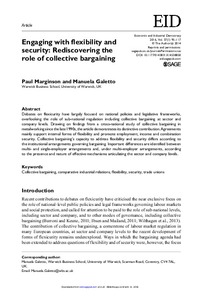Engaging with flexibility and security: Rediscovering the role of collective bargaining

Marginson, Paul ; Galetto, Manuela
Economic and Industrial Democracy
2016
37
1
February
95-117
collective bargaining ; labour relations ; trade union ; flexicurity
Collective bargaining
http://dx.doi.org/10.1177/0143831X14538850
English
Bibliogr.
"Debates on flexicurity have largely focused on national policies and legislative frameworks, overlooking the role of sub-national regulation including collective bargaining at sector and company levels. Drawing on findings from a cross-national study of collective bargaining in metalworking since the late 1990s, the article demonstrates its distinctive contribution. Agreements mainly support internal forms of flexibility and promote employment, income and combination security. Collective bargaining's capacity to address flexibility and security differs according to the institutional arrangements governing bargaining. Important differences are identified between multi- and single-employer arrangements and, under multi-employer arrangements, according to the presence and nature of effective mechanisms articulating the sector and company levels. "
Digital
The ETUI is co-funded by the European Union. Views and opinions expressed are however those of the author(s) only and do not necessarily reflect those of the European Union or the ETUI.